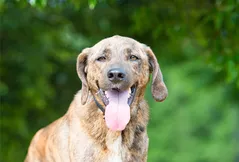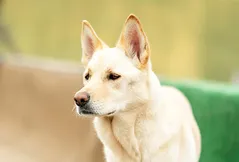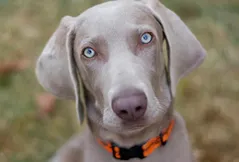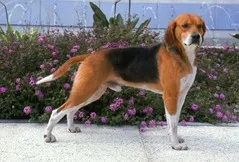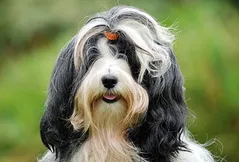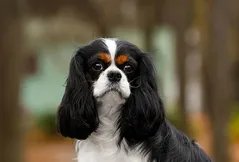
Cavalier King Charles Spaniel
The Cavalier is a sweet, gentle, and affectionate breed, very eager to please their human.
Overall Status
| Height | 12 to 13 inches at the shoulder |
| Temperament | Affectionate, Gentle, Graceful |
| Weight | 13 to 18 pounds |
| Life Expectancy | 10 to 14 years |
| Coat Color | Black and Tan, Blenheim, Ruby, Tricolor |
| Barking Level | Medium |
Quick Factors
| Playfulness | |
| Dog Friendly | |
| Exercise Need | |
| Grooming Needs | |
| Strangers Friendly | |
| Family Affectionate |
Daily Care
Grooming Tips
For a coated breed, the Cavalier is relatively easy to groom. The medium-length silky coat is not so heavy that it requires hours of brushing, and it sheds dirt easily. The Cavalier sheds, like all dogs, but regular brushing will remove dead hairs so they don’t float off onto your floor, furniture, and clothing.The long, silky hair on the Cavalier’s ears, tail, belly, and legs, known as feathering, should be brushed two or three times a week to prevent mats or tangles from forming. Be sure to check behind the ears and where the leg meets the body; that’s where they commonly form. Use a slicker brush or stainless steel comb to remove tangles, then bring outshine with a bristle brush. The coat does not require any trimming for the show ring; indeed, such trimming is prohibited by the breed standard.Check the ears on a weekly basis for signs of infection, irritation, or wax build up. Cleanse regularly with a veterinarian-approved cleanser and cotton ball. Brush the teeth at least once per week to prevent tartar buildup and fight gum disease. Additionally, nails should be trimmed once per month if the dog does not wear down the toenails naturally.
Exercise Tips
This little dog needs a moderate amount of hearty exercise every day, but it doesn’t have to be long or exhaustive. This dog likes to be outsidebut is not really hearty for extreme temperatures. And this breed does very well in competitive obedience.With this said,Cavalier King Charles Spaniel puppies should not be given too much exercise because their joints and bones are still growing and too much pressure on them could result in causing a dog a few problems later on in their lives. They should not be allowed to jump up or off furniture nor should they be allowed to run up and down the stairs because this puts too much pressure on their still growing joints and limbs.Daily, energetic walk – 20 to 40 minutesHikes – keep this dog on a lead unless she responds well to being recalledActive games, especially chasing games likeFetchand TagDog parks,Dog sports,AgilityCompetitive obedienceCanine freestyle dancing
Feeding Tips
As a toy breed, the Cavalier King Charles Spaniel doesn’t have a necessarily large diet compared to other dogs, but it’s important to remember that it is one of the heaviest and largest toy breeds in existence. A full, lustrous coat will require good nutrition and care, so be sure to feed your dog good whole foods like meat and vegetables in addition to a normal dog diet of kibbles and treats.If you get a Samoyed puppy from a breeder, they would give you a feeding schedule and it's important to stick to the same routine, feeding the same puppy food to avoid any tummy upsets. You can change a puppy's diet, but this needs to be done very gradually always making sure they don't develop any digestive upsets and if they do, it's best to put them back on their original diet and to discuss things with the vet before attempting to change it again.Older dogs are not known to be fussy or finicky eaters, but this does not mean you can feed them a lower quality diet. It's best to feed a mature dog twice a day, once in the morning and then again in the evening, making sure it's good quality food that meets all their nutritional requirements. It's also important that dogs be given the right amount of exercise so they burn off any excess calories or they might gain too much weight which can lead to all sorts of health issues. Obesity can shorten a dog's life by several years so it's important to keep an eye on their waistline from the word go.Learn about which human foods are safe for dogs, and which are not. Check with your vet if you have any concerns about your dog’s weight or diet. Clean, fresh water should be available at all times. Like many large breeds, Saint Bernard can experience bloat, a life-threatening condition where the stomach distends and twists. The causes of bloat aren’t fully understood, but experts agree that multiple, small meals per day and preventing vigorous exercise around mealtimes may help reduce the chances of it happening.
Health Tips
The average life expectancy of the Cavalier is between 10 and 14 years. Breed health concerns may include Chiari-like malformation,hip dysplasia, endocardiosis,patent ductus arteriosus, mitral valve disease, patellar luxation,entropion, distichiasis,keratoconjunctivitis sicca, retinal dysplasia, brachycephalicupper airway syndrome, and syringomyelia.
Trainability
The Cavalier is a sweet, gentle, and affectionate breed, very eager to please their human. They are friendly with strangers and with other animals, and they can do very well with children. They are smart and train easily, and Cavaliers excel in a number of canine sports includingobedience,rally, andagility. With their sweet nature, they also makefantastic therapydogs.As with all breeds, earlysocializationandpuppy training classeswill help the young Cavalier to learn good manners and be comfortable with a wide variety of people and situations.Puppies should be properly socialized to develop the amiable, outgoing personality that is characteristic of the breed. They’re successful in performance and companion events such as earthdog, barn hunt, obedience, and agility.
History
Small toy spaniels have been known in Europe and Great Britain since the 16th century and were popular subjects of the most famous painters from the 16th, 17th and 18th centuries. The Cavalier King Charles Spaniel is descended from these toy spaniels.Early toy spaniels were quite common as ladies’ pets, and during the reign of King Charles II, they were given the royal title King Charles Spaniel (English Toy Spaniel).When serious show dog breeding began in England, the dog's face structure changed to have the look of thePuguntil an American, Roswell Eldridge, offered a cash prize at the Crufts Dog Show for a dog that resembled those in the early paintings. With careful breeding, the shorter-faced dogs became the English Toy Spaniel, and those that more closely resembled the originals became known as the Cavalier.The breed is notable for its four distinct color patterns, each of which, at various times, was associated with a particular noble family: Blenheim (chestnut markings on a white background), Tricolor (black markings on a white background), Black and Tan (black with tan markings), and Ruby (a rich red).

